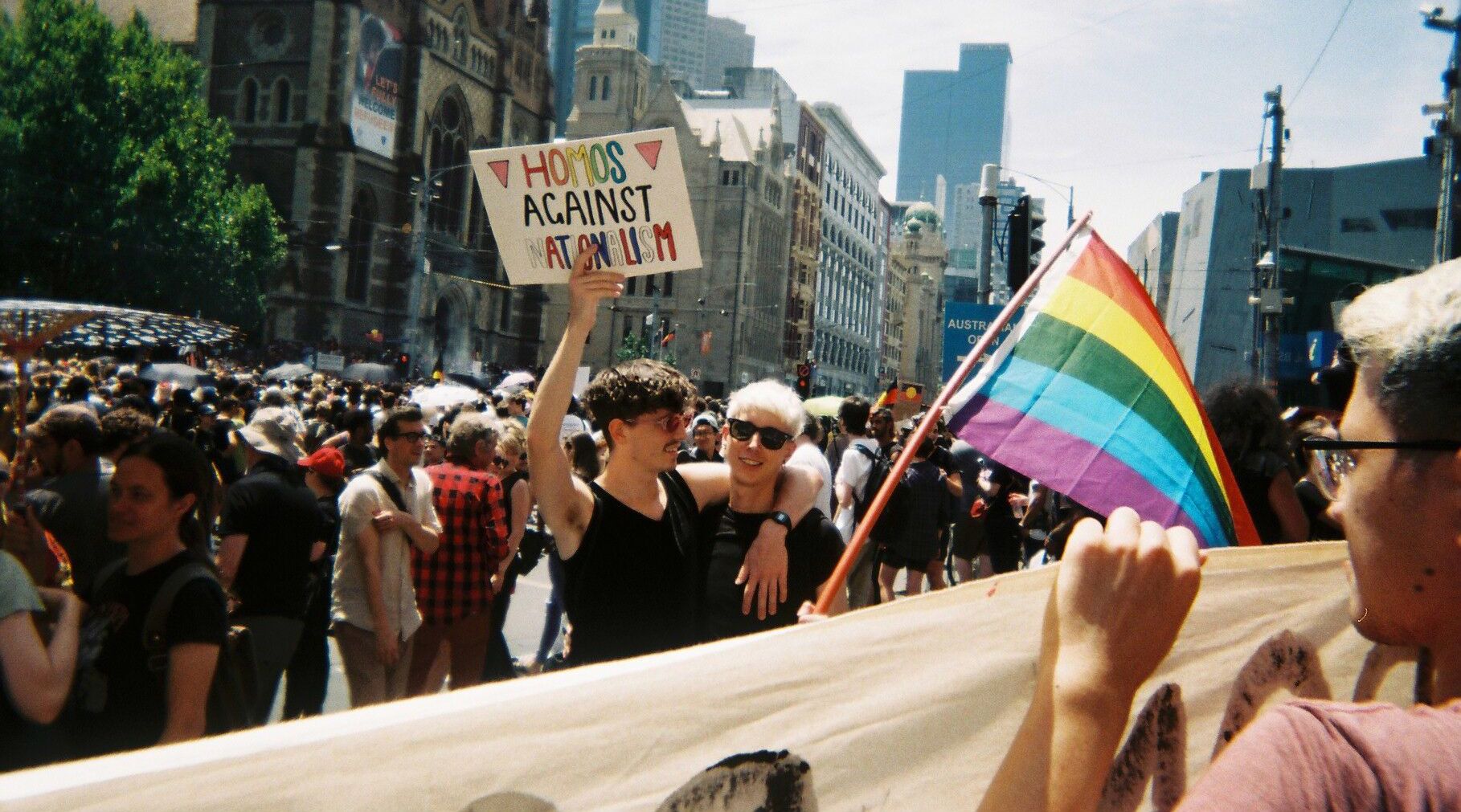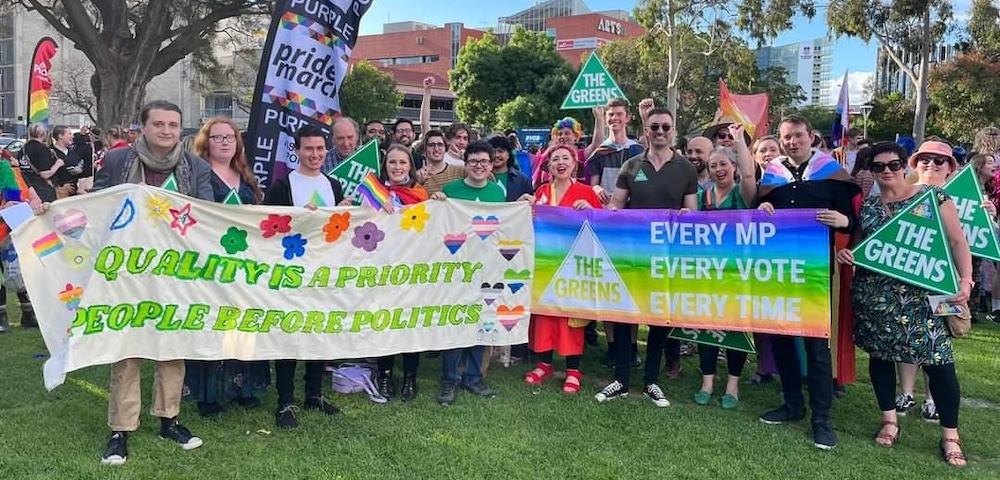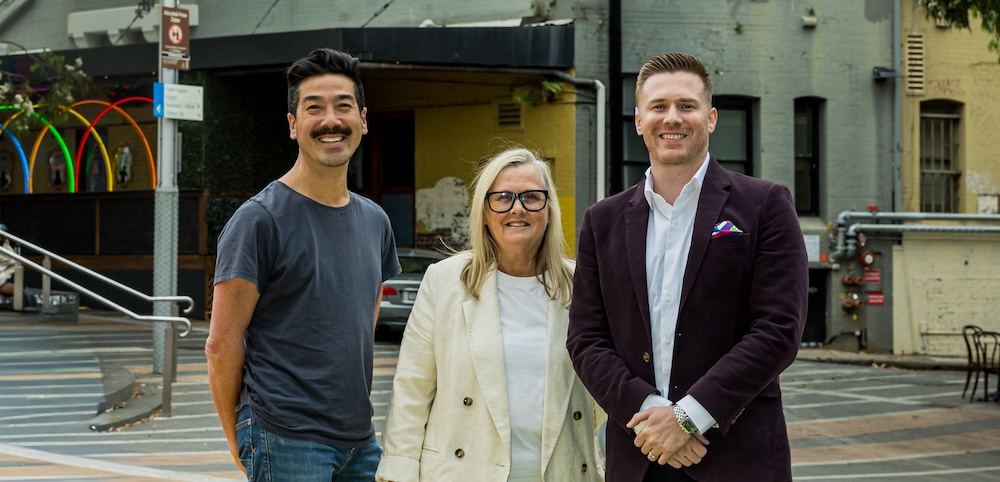
‘It’s about time we start supporting other people in their fights against injustice’

When Australia achieved marriage equality last year, many gays thought their fight was over. Academic and activist Joshua Badge explores why it’s time we start showing up to support other people in their fights against injustice.
***
Earlier this year I had the great privilege of demonstrating with the activist group No Pride in Invasion on January 26.
To my knowledge, this was the first time that an explicitly queer contingent had marched in solidarity with our First Peoples for the event.
At the end of the rally, we were standing on the steps of Flinders Street station with our banners, signs, and flags when an Aboriginal woman named Tanya asked us for a photo, and we happily obliged.
She was about to leave, but then turned back with an afterthought: “It’s about time you mob turned up.”
The significance of this moment stuck with me, particularly on the heels of our community marshalling a tremendous amount of people and resources in pursuit of access to marriage.
For many people, gay and straight, marriage equality rallies were their first introduction to direct action.
People mobilised around marriage not only because the discrimination was obvious, but because the institution was a critical part of the heterosexual narrative — marriage, kids, home ownership, and eventual retirement.
The Yes campaign promoted a sexless, and therefore respectable, love-is-love sound bite while the No campaign luxuriated in a circus of transphobia.
What has largely escaped notice, however, is that several million Australians didn’t give a toss one way or the other.
As many as 3.2 million people didn’t trouble themselves with posting their vote.
Such a lack of enthusiasm for the rights of others is deeply frustrating. How could they be so apathetic and self-absorbed?
We should start by asking this of ourselves.
Tens of thousands of people marched for same-sex marriage around the country, and this momentum could well have shifted on to other issues. Instead, it has evaporated.
Many who marched for marriage have since retreated to the comfort of Chapel Street and Oxford Street.
There were hints of this during the postal survey. When trans and gender diverse people became the No campaign’s preferred punching-bag, it met little resistance.
This was a sadly familiar experience for the folks living with the highest rates violence in our communities.
We might say that we didn’t want to dignify such tactics with a response, but that would be particularly charitable.
Some felt that trans rights were a different issue for a later date, but the fact is that many gays didn’t care so long as we won marriage.
This, then, is our double standard.
We rightly expect others to support us and our rights but are too often absent in the struggles of others, even from within our community.
Since we secured gay marriage, faith-based discrimination has gained traction and conversion therapy looks set to become another critical issue, but many others have fallen by the wayside.
Marriage was not a panacea for all our woes, and people walking down the aisle has not vanquished homophobia forever. Higher than average rates of depression, suicide, and homelessness are enduring issues.
We urgently need LGBT specific domestic violence services and better monitoring of hate crimes.
We need to make sure that gender clinics are well funded, and should work to prevent unnecessary interventions on intersex children.
After the moral panic around Safe Schools, it is more important than ever to press for queer-inclusive programs, and not just anti-bullying schemes but also sex education.
This will mean combating transphobia in politics and the press in a way the Yes campaign avoided.
However, confining our efforts only to people like ourselves is short-sighted and insular.
For instance, we should not object to offshore internment just because there are LGBT people imprisoned in the camps. We should oppose internment because it is horribly wrong.
Many of us felt battered by the homophobia of politicians and pundits during the survey, and indeed afterwards.
However, we cannot beg for sympathy when so few of us speak out against the prejudiced rhetoric targeting Aboriginals, Africans, and Muslims.
Many white cis gays feel that it’s not their fight. Trans rights are a trans issue. Racism is a problem for people of colour. Women will figure out misogyny, and so on.
This petty conservatism keeps us splintered and easier to persecute.
Our willingness to blame the No vote on migrant suburbs, when influential white Christians designed the whole exercise, speaks to a lack of solidarity.
Similarly, many felt that we were the only ones to suffer the indignity of a public vote even though it was the anniversary of the 1967 referendum.
Tanya was too right — it is about time we show up to support other people in their fights against prejudice and injustice.
Offshore internment, Indigenous deaths in custody, men’s violence against women, and the rise of the far right are all struggles in which we should play a more active role.










There was a big lesbian and gay contingent in the anti bicentennial indigenous mobilisation in 1988. We had tshirts 200 years of oppression and bad taste